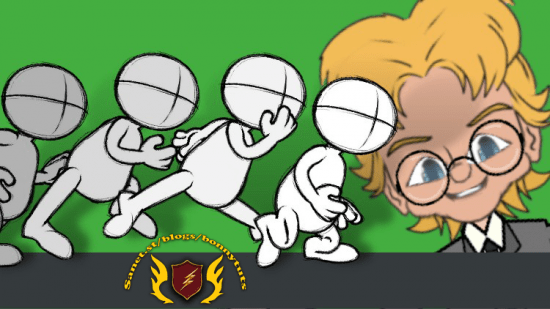
MP4 | Video: h264, 1280×720 | Audio: AAC, 44.1 KHz, 2 Ch
Genre: eLearning | Language: English + srt | Duration: 21 lectures (3h 35m) | Size: 1.88 GB
Learn the Essentials and Become a Power User – Animate Your Projects Sooner.
What you’ll learn
Become a Power User of Cartoon Animator starting from no knowledge of the application.
Learn Cartoon Animator’s key features needed to animate pre-existing props, scenes and characters from your content library.
Learn features in logical order, progressing up to advanced level without becoming overwhelmed.
Understand how Cartoon Animator’s timeline works and where to find the key frames each of the apps key frame editors create.
Learn how to animate Cartoon Animator’s camera.
Learn how to add voices, music, sound effects, and how to export your projects in different formats.
Requirements
A working Trial or Licensed copy of Reallusion’s Cartoon Animator 4 (Pro or Pipeline).
No prior knowledge of using Cartoon Animator necessary.
A desire to get off the Free Video Tutorial Treadmill and Learn all you need to know in one course.
Description
The Lazy Animator, Beginner’s Guide to Cartoon Animator is the kind of course I wish was available when I was learning the software back in 2012. I just wanted to learn Cartoon Animator as quickly as possible so I could spend more time creating my own animations without getting stuck on things I had yet to learn.
With just over three and a half hours of video tutorials The Lazy Animator Beginner’s Guide to Cartoon Animator is a crash course in all the main features you need to know in order to make 2D animated cartoons with Cartoon Animator. Suited to complete beginners or even if you’ve already been learning Cartoon Animator for a while.
Follow along but there are no step by step projects to complete. The course is a structured walkthrough of all the essential features you need to know to make amazing animations.
Designed to teach you the easiest concepts first, gradually moving up to harder, more complex features, that you will not be intimidated by, if you follow through all the videos in order.
There are six main video topics (with each topic section split into about ten minute bites so you’re never too far from taking a break). You’ll learn about
Navigating the stage, Scenes, Converting Props, Saving Scenes and Projects (1 Video).
How to animate the camera using the Timeline and Transition Curves (1 Video).
All the types of Props and how to transform, deform, and animate them using Transitions, Transition Curves or Elastic Motions, plus where each system creates key frames in the timeline. (3 Videos).
All the types of Characters and how to animate G3 Characters using pre-animated motions, pre-animated root motions, and the 2D Key Motion editor, as well as how to modify, make, and save custom motions. You’ll also learn where motion files and the 2D Key Motion editor make key frames in the timeline and how you can apply transition curves to them. (6 Videos).
How to make your characters talk with auto lip syncing, and how to manually adjust the lip sync in the timeline. You’ll learn how to animate G3 character faces using the Face Puppet Editor or the Face Key Editor. You’ll learn where both systems create key frames in the timeline and how you can apply transforms, deforms, and transition curves to facial animations. You’ll also learn about character layers and where to find the key frames for those. (6 Videos).
Finally you’ll learn how to add sound effects and music, adjust their volume, and how to edit audio in the timeline. Then you’ll learn how to export your work as a single frame, frame sequence, transparent video, or standard video ready to import into your preferred video editor. (2 Videos).
As you can see, even the course outline goes from easy to progressively harder concepts because so much thought has gone into the learning order.
Again, I highly recommend you watch all the videos in order, at least once, even if you think you already know the earlier stuff (those sections are short, you’ll power through them!). The order matters because later videos assume you’ve seen what has been shown before. It’s how I can teach so much in such a short time.
The included Office and Business Woman Project Scene
If getting you up to advanced level with Cartoon Animator as fast as possible wasn’t enough, the course comes with a free Office scene project that is Render Styles compatible (you’ll know what that means by part 3 of the course if you’re completely new), and includes a G3-360 head, bone hands, Office woman character that you can use in your own personal or commercial projects.
When you’re finished the course there is a PDF document with all the time codes for what you learned in each video so you can easily find anything you wish to revisit without having to scrub through each video trying to remember where that information was.
Essentially this is the last beginner’s course you’ll ever need. It doesn’t teach you everything (how could it in just over three and a half hours) but it goes so much further than any other beginners course. Even advanced users might find a thing or two they haven’t tried or didn’t know about.
Created by me (David Arandle (TET)), a Certified Reallusion Trainer, I’ve been animating with Cartoon Animator 4 since its first iteration as CrazyTalk Animator Pro, released in 2010.
Who this course is for
Ideal for complete beginners.
Also suitable if you have intermediate knowledge but still struggling to learn advanced features.
Can be used as a reference guide to Cartoon Animator. All key Animation tools are demonstrated.
Password/解压密码www.tbtos.com
转载请注明:0daytown » Learn 2D Animation Fast with Reallusion’s Cartoon Animator 4